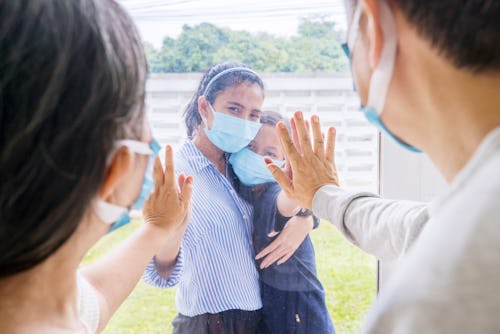Health
Doctors Explain Why You Can’t Quite Hug Your Nana Just Yet
"Being vaccinated does not flip a switch and put a force field around your grandparents.”

As COVID-19 vaccines slowly roll out, the prospect of actually seeing — and maybe hugging — your grandparents is looming large. And we're talking actually seeing them, not just the awkward face angles you've been getting for nearly a year because they still don't quite know how Zoom works. But before you load up the car for a trip to Grandma's, it'll be good to have a family chat about whether you can actually see your grandparents once they get vaccinated for COVID.
Can I See My Grandparents If They Got Vaccinated And I Haven't Yet?
"Being vaccinated does not flip a switch and put a force field around your grandparents," says Dr. Michael Green, M.D., a family medicine physician and the associate medical director of Northwell Health-GoHealth Urgent Care.
The basics to understand about the COVID vaccine are that while it reduces the risk of the vaccinated person getting sick from COVID, it doesn't necessarily prevent transmission of COVID. That means the risk of you getting your grandparents sick is still not zero, even if they're vaccinated; they could also potentially spread COVID to you, or to other people in their orbit that aren't vaccinated.
"As long as the community levels of COVID are high, it is best to see your grandparents outside even after they are vaccinated," Dr. Green tells Bustle. That's because vaccines don't exist in a vacuum: If your town or your grandparents' town still have high infection rates, their individual vaccines don't cancel out the virus' existence in the neighborhood — many more people need to be vaccinated in order for it to stop spreading in the community.
So while the COVID vaccine will take effect in the human body between seven days and a few weeks after receiving the second dose, high community rates mean that you really shouldn't take off your mask and head to your grandpa's couch to watch football quite yet.
Does Being Vaccinated Mean My Grandparents Definitely Can't Get COVID?
"While the vaccines have high efficacy rates, they aren't 100% effective at preventing you from getting sick from the virus," says Alyssa Billingsley, PharmD, the director of strategic program development at GoodRx Research. So while you probably want to encourage your grandparents to take advantage of getting their vaccine ASAP, you'll also want to prioritize caution when getting ready to visit. Don't visit if you're sick, or if rates are high near you or your grandparents' community.
"Bottom line is that you’ll need to weigh the risks of the visit and the activities you’ll be doing, plan ahead, and take precautions to minimize exposure."
Could I Get COVID From My Grandparents?
"It is important to keep in mind that although the risks are reduced, they aren’t zero," Billingsley says. "We don’t fully know yet whether or not you can still transmit the virus after getting vaccinated." Vaccines don't make viruses stop existing — they just help prevent you from getting sick once it's in your body. (Think about the flu vaccine: it doesn't prevent the flu from spreading around your school or workplace, but it can help you avoid getting sick yourself.) "So it is still possible for your grandparents to catch the virus from another family member during the visit, and they may be able to transmit the virus to you, too." The vaccine is still great news, but folks should keep their masks on after getting vaccinated for now.
How Can I See My Grandparents After They're Vaccinated?
It's important to understand that there are still risks involved in social interaction, Billingsley tells Bustle — even with your vaccinated granny. "At least for now, you should assume that everyone is at risk of getting infected and possibly getting sick," she says. "You’ll want to wear masks and social distance, at a minimum. Outdoor activities are preferred over indoor activities, if possible. And it may be a good idea to have everyone quarantine beforehand and get tested to further manage the risks."
Until community rates are much lower than they are, caution is your best bet. "Remember to respect and protect those that are immunocompromised or elderly," Dr. Green says. "Wear a mask, wash your hands, and socially distance."
Experts:
Dr. Michael Green, M.D., family medicine physician, associate medical director of Northwell Health-GoHealth Urgent Care
Alyssa Billingsley, PharmD, director of strategic program development at GoodRx Research
This article was originally published on